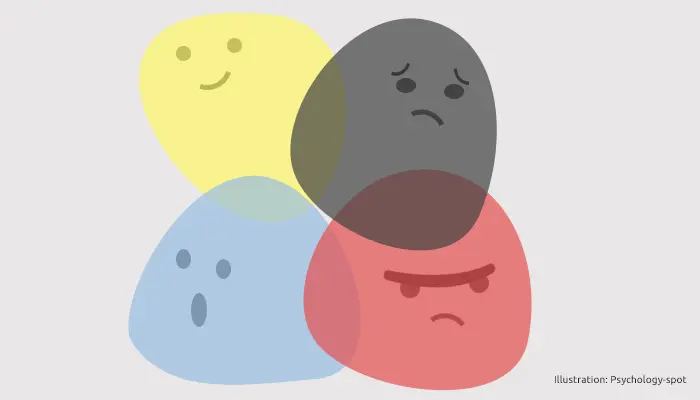
Suppressing emotions is harmful, but exalting them and letting them run wild too. When we get mature, we generally reach a sweet middle ground, at least in most situations in life, so that we are able to manage our emotions so they don’t get out of hand, expressing them assertively when conditions call for it. Intense people have not reached that balance, so they live dragged by their emotional states and, incidentally, drag those around them.
What is being an intense person?
Intense people experience very deep and passionate emotions and feelings. As a result of this rich emotional world, they can infect us with their zest for life, positivity and energy. They easily convey their enthusiasm, determination and vitality to us.
They are people who are very committed to what they do, they are 200% involved in their projects and relationships. They are not usually afraid of challenges and are incredibly motivated. They are also very empathetic and sensitive, so they can put themselves in the shoes of others with relative ease.
However, every coin has its reverse. Intense people also get carried away by negative emotions, so they can become extremely sensitive. They can get hurt easily, angry over small things, or break down over small problems.
Intense people take things too personally, so they tend to respond dramatically to many circumstances in life, even those that don’t concern them directly. This sensitivity makes them particularly vulnerable and often makes their relationships difficult.
Sometimes that emotional awareness leads to ruminative thought patterns, so it’s not unusual for intense people to end up obsessing over certain situations, to the point of hurting themselves.
They can also become very possessive, domineering and jealous as they often demand the same unconditional dedication to others – a level of commitment and passion that is difficult for other people to maintain over time. In fact, it’s not unusual for such skin-deep sensitivity to lead them to exaggerate the meaning of their relationships. By misinterpreting each other’s signals of commitment and connection, sensitive people end up overstepping some boundaries, which is why they can be seen as too intrusive.
The “problem” of emotional intensity
In 2021, neuroscientists at the Max Planck Institute in Frankfurt set out to test how we react to emotional intensity. In a series of experiments, they exposed participants to nonverbal vocalizations—screams, laughter, sighs, and moans—that expressed positive or negative emotions. What is interesting is that the intensity of these sensations oscillated between a minimum and maximum range.
The researchers found that when emotions are subtle, they are difficult to interpret. Instead, as their intensity increased, so did the listeners’ ability to judge them. However, when emotions reached a high intensity, the ability to interpret them diminished.
They concluded that “The widespread belief that the stronger an emotion is, the easier it is to identify it, is a mistake. Extremely intense emotions are highly ambiguous when it comes to understand their meaning.”
As the emotion becomes more intense, its meaning becomes clearer, but when it crosses a certain threshold, it simply becomes overwhelming and confusing. Overly intense emotional expressions activate our sympathetic nervous system, triggering a fight or flight response. Under these conditions, we don’t think clearly and can become overwhelmed to the point of not knowing how to respond. It is as if our rational brain “disconnected” and we ran out of reference points.
That research could explain why intense people end up being suffocating and generate a sense of mental exhaustion: we just have a hard time dealing with their emotional tsunami and making sense of it and responding accordingly.
In fact, the emotional intensity is often unpredictable. Emotional fluctuations and their intensity can be too confusing and draining for those who have to live with these people day after day.
How to stop being an intense person? It is necessary?
Intense persons shows an unusual emotionality in a world accustomed to containment – and often also to simulation. For this reason, their way of being can even be threatening to some people. Obviously, that’s not a good enough reason to want to stop being an intense person.
Experiencing all these emotions allows to live more fully and take advantage of all the energy that comes from within. That is not negative, nor is it to feel intensely nostalgia, loneliness or sadness since all emotions provide learning. In fact, it is necessary to connect with our emotions to capture its message because, well interpreted, it projects us to a wiser future.
Is there anything worse than feeling and acting like we don’t feel anything? How much energy do we waste trying to project an image of strength when we feel afraid, powerless or weak? How much compassion do we lose by faking a smile when we feel like crying? How exhausted we become pretending to be tireless when we can’t anymore?
Emotions are not the enemy, but it is necessary to manage their intensity. You don’t have to decaffeinate yourself to fit into the world of others because when intensity is lost, the will to live is lost. However, learning to manage the intensity of your responses will not only improve your interpersonal relationships, but will also help you find inner peace since, deep down, intense people often go from euphoria to unhappiness or from anger to guilt, without stopping at serenity.
Therefore, to be a “healthily” intense person it is important to do an act of introspection. Listen to the intensity of your feelings and do something positive with them.
Don’t use them to get attention, manipulate those around you, or justify your fits of rage, panic, or crying. If you feel intense joy, pass it on to others. And if what you feel is sorrow or sadness, share those feelings without overwhelming the other.
Your emotions should help you connect, not drive others away. They should serve you to get to know yourself better and live more fully, they should not become your main enemy. Emotional intensity is not bad, you just have to learn to measure it and use it to your advantage.
Source:
Holz, N. et. Al. (2021) The paradoxical role of emotional intensity in the perception of vocal affect. Sci Rep; 11(1):9663.



